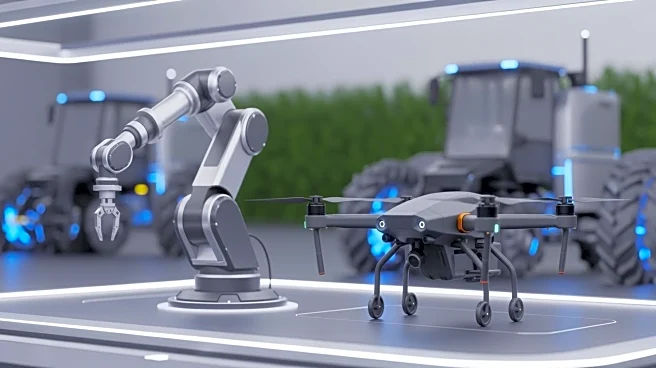What's Happening?
Autonomous Solutions, Inc. (ASI), a leader in industrial vehicle automation, showcased its Mobius® autonomous fleet management system at FIRA USA 2025, held at the Yolo County Fair in Woodland, California.
The system enables non-stop, 24-hour autonomous farming operations, allowing the agriculture industry to manage fleets of farming vehicles without needing to replace existing equipment. ASI's Ag Product Manager, Bret Turpin, expressed excitement about the potential of these innovations to transform agricultural practices. ASI has been successful in forming partnerships with companies like Agricef and Balanced Engineering, and is actively working on projects in Brazil.
Why It's Important?
The introduction of ASI's autonomous farming system represents a significant advancement in agricultural technology, promising increased efficiency and productivity. By enabling continuous operations, the system could reduce labor costs and improve crop yields, benefiting farmers and the agricultural sector. The technology also addresses challenges such as labor shortages and the need for sustainable farming practices. ASI's approach allows for integration with existing equipment, making it accessible to a wide range of agricultural businesses. This development could lead to broader adoption of automation in agriculture, driving innovation and competitiveness in the industry.
What's Next?
As ASI continues to develop and refine its autonomous farming technology, the company is likely to expand its partnerships and projects globally. The success of the Mobius® system at FIRA USA 2025 may lead to increased interest from agricultural businesses seeking to modernize their operations. ASI's ongoing collaborations in Brazil and other regions suggest a growing international footprint. Future advancements may focus on enhancing the system's capabilities and integrating it with other agricultural technologies to further optimize farming processes.
Beyond the Headlines
The shift towards autonomous farming raises important ethical and economic considerations, such as the impact on employment in rural areas and the need for regulatory frameworks to ensure safe and responsible use of automation. Additionally, the technology could contribute to environmental sustainability by optimizing resource use and reducing waste. As the industry evolves, stakeholders will need to address these challenges to maximize the benefits of automation while mitigating potential drawbacks.











